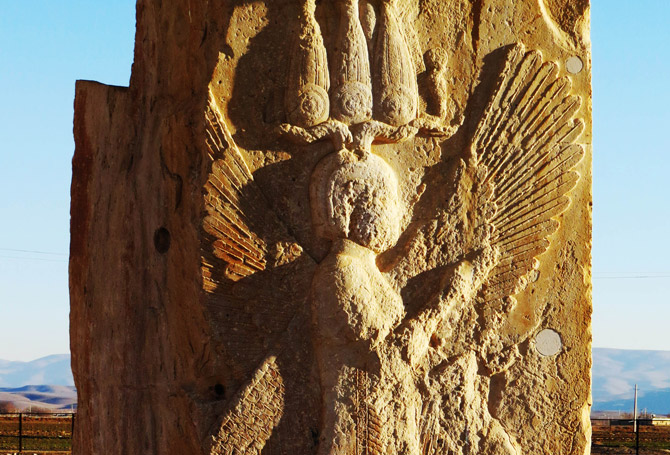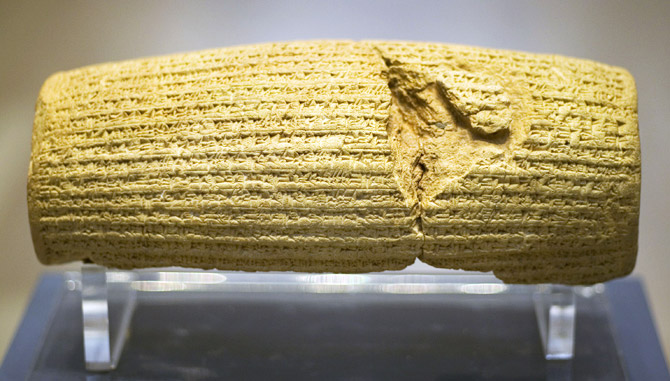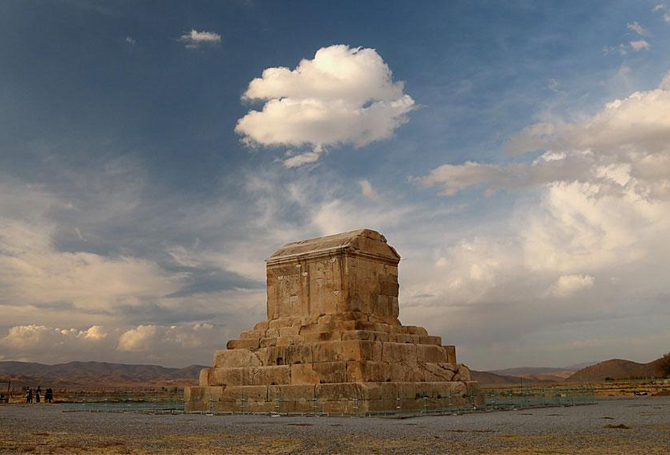Cyrus the Great
Cyrus the Great, the founder of the Achaemenid Empire
Cyrus the Great was the founder of the Achaemenid Empire, the first Persian empire. Under his rule, the empire embraced all of the previous civilized states of the ancient Near East, expanded vastly and eventually conquered most of Western Asia and much of Central Asia.

Spanning from the Mediterranean Sea and Hellespont in the west to the Indus River in the east, the empire created by Cyrus was the largest the world had yet seen. At its maximum extent under his successors, the Achaemenid Empire stretched from parts of the Balkans and Southeast Europe proper in the west to the Indus Valley in the east.
Cyrus the Great and Human Rights
Cyrus the Great is remembered for his achievements in human rights, politics, and military strategy, as well as his influence on both Eastern and Western civilizations. The Achaemenid influence in the ancient world would eventually extend as far as Athens, where upper-class Athenians adopted aspects of the culture of the ruling class of Achaemenid Persia as their own.
Cyrus Cylinder and Conquest of Babylon
By the year 540 BC, Cyrus captured Elam and its capital, Susa. Near the beginning of October 539 BC, Cyrus fought the Battle of Opis in or near the strategic riverside city of Opis on the Tigris, north of Babylon. The Babylonian army was routed, and on 10 October, Sippar was seized without a battle, with little to no resistance from the populace. Nabonidus, who had retreated to Sippar following his defeat at Opis, fled to Borsippa. Prior to Cyrus's invasion of Babylon, the Neo-Babylonian Empire had conquered many kingdoms. In addition to Babylonia itself, Cyrus probably incorporated its subnational entities into his Empire, including Syria, Judea, and Arabia Petraea. After taking Babylon, Cyrus the Great proclaimed himself "king of Babylon, king of Sumer and Akkad, king of the four corners of the world" in the famous Cyrus Cylinder, an inscription deposited in the foundations of the Esagila temple dedicated to the chief Babylonian god, Marduk. The text of the cylinder denounces Nabonidus as impious and portrays the victorious Cyrus pleasing the god Marduk. It describes how Cyrus had improved the lives of the citizens of Babylonia, repatriated displaced peoples, and restored temples and cult sanctuaries. Cyrus the Great's dominions composed the largest empire the world had ever seen to that point. At the end of Cyrus' rule, the Achaemenid Empire stretched from Asia Minor in the west to the Indus River in the east.
Cyrus Cylinder or Cyrus Charter
The Cyrus Cylinder or Cyrus Charter is an ancient clay cylinder, on which is written a declaration in Akkadian cuneiform script in the name of Persia's Achaemenid king Cyrus the Great. The text on the Cylinder praises Cyrus, sets out his genealogy and portrays him as a king from a line of kings. The Babylonian king Nabonidus, who was defeated and deposed by Cyrus, is denounced as an impious oppressor of the people of Babylonia and his low-born origins are implicitly contrasted to Cyrus' kingly heritage. The victorious Cyrus is portrayed as having been chosen by the chief Babylonian god Marduk to restore peace and order to the Babylonians.

The text states that Cyrus was welcomed by the people of Babylon as their new ruler and entered the city in peace. It appeals to Marduk to protect and help Cyrus and his son Cambyses. It extols Cyrus as a benefactor of the citizens of Babylonia who improved their lives, repatriated displaced people and restored temples and cult sanctuaries across Mesopotamia and elsewhere in the region. It concludes with a description of how Cyrus repaired the city wall of Babylon and found a similar inscription placed there by an earlier king.
Cyrus the Great's Religion
Though it is generally believed that Zarathushtra's teachings maintained influence on Cyrus's acts and policies, so far no clear evidence has been found to indicate that Cyrus practiced a specific religion.
Tomb of Cyrus the Great
Tomb of Cyrus the Great is located one kilometer from Pasargadae palaces, in Saadat Shahr, Pasargad County, Fars Province, Iran.

Tomb of Cyrus the Great is a simple structure with unique architecture that is constructed of yellowish-white calcareous stones with the total height of over 11 meters.
Cyrus the Great in the Bible
According to the Bible, Cyrus the Great, king of the Achaemenid Empire, was the monarch who ended the Babylonian captivity. In the first year of his reign he was prompted by God to decree that the Temple in Jerusalem should be rebuilt and that such Jews as cared to might return to their land for this purpose. Moreover, he showed his interest in the project by sending back with them the sacred vessels which had been taken from the First Temple and a considerable sum of money with which to buy building materials.
Cyrus the Great's quotes
Some of the most famous of Cyrus the Great's quotes are as follows:
"Whenever you can, act as a liberator. Freedom, dignity, wealth - these three together constitute the greatest happiness of humanity. If you bequeath all three to your people, their love for you will never die." ~ Cyrus the Great
"Even if the skies were shorter than my knees, I would not kneel." ~ Cyrus the Great
"A man's enjoyment of all good things is in exact proportion to the pains he has undergone to gain them." ~ Cyrus the Great
"Diversity in counsel, unity in command." ~ Cyrus the Great
"Success always calls for greater generosity - though most people, lost in the darkness of their own egos, treat it as an occasion for greater greed. Collecting boot is not an end itself, but only a means for building an empire. Riches would be of little use to us now - except as a means of winning new friends." ~ Cyrus the Great
"We love ourselves notwithstanding our faults, and we ought to love our friends in like manner." ~ Cyrus the Great
"Brevity is the soul of command. Too much talking suggests desperation on the part of the leader. Speak shortly, decisively and to the point–and couch your desires in such natural logic that no one can raise objections. Then move on." ~ Cyrus the Great
"All men have their frailties; and whoever looks for a friend without imperfections, will never find what he seeks." ~ Cyrus the Great
"O man, whoever you are and wherever you come from, for I know you will come, I am Cyrus who won the Persians their empire. Do not therefore begrudge me this bit of earth that covers my bones." ~ Cyrus the Great
"You cannot be buried in obscurity: you are exposed upon a grand theater to the view of the world. If your actions are upright and benevolent, be assured they will augment your power and happiness." ~ Cyrus the Great
"In my experience, men who respond to good fortune with modesty and kindness are harder to find than those who face adversity with courage." ~ Cyrus the Great
"I am Cyrus, king of the world." ~ Cyrus the Great
"Do not suppose, my dearest sons, that when I have left you I shall be nowhere and no one. Even when I was with you, you did not see my soul, but knew that it was in this body of mine from what I did. Believe then that it is still the same, even though you see it not." ~ Cyrus the Great
"May all the gods whom I settled in their sacred centers ask daily of Bêl and Nâbu that my days be long and may they intercede for my welfare. ... The people of Babylon blessed my kingship, and I settled all the lands in peaceful abodes." ~ Cyrus the Great
